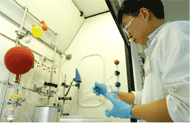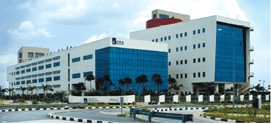The pharmaceuticals industry makes a significant contribution to Singapore\'s economy. To strengthen this position and to foster future development, the Institute of Chemical and Engineering Sciences was established. Professors Keith Carpenter and KC Nicolaou talks about the institute\'s future aims.
The Institute of Chemical and Engineering Sciences (ICES) is one of the research institutes under the Agency for Science, Technology and Research (A*STAR). Established in 2002, the mission is to develop scientific knowledge, R&D manpower and technological capabilities to support current and future needs of Singapore's chemical, biomedical and process engineering industries.
ICES actively supports and encourages the expansion of R&D in Singapore's rapidly expanding chemical and pharmaceutical industries. It has world-class facilities housed in Jurong Island alongside the chemicals industry and pharmaceutical manufacturing and alongside biomedical research at Biopolis.


The research programmes cover chemistry and chemical engineering science, combined with advanced analytical characterisation and measurement to develop state-of-the-art technology for the petrochemical, general chemical, fine chemical and pharmaceutical industries. The key research programmes relevant to pharmaceuticals and healthcare are Crystallisation and Particle Science, the Chemical Synthesis Lab@Biopolis and New Synthesis Techniques and their application to Pharmaceutical and Chemical processing.
The Crystallisation and Particle Science programme aims to develop fundamental understanding of crystallisation and formulation science and to apply this knowledge to advance cutting edge techniques as well as to solve industrial problems. A major focus for the research is the application to pharmaceutical and fine chemical active ingredient manufacture and formulation, although the fundamental knowledge can be applied to problem solving for any chemical system. The crystallisation team has the ability to invent highly efficient separations to provide high purity, specific size and control of form and physical characteristics. The isolation is often a critical step that determines the downstream processability and the final product quality. The aim is to provide a better understanding of crystallisation fundamentals and processes and to develop methods and technology to achieve better control of the product. The current research topics include:
Formulation Science is a multi-disciplinary area that focuses on tailoring physiochemical properties of constituent components to deliver products with the desired attributes and functions. The research topics in this area include:
CSL@Biopolis
The Chemical Synthesis Laboratory@Biopolis (CSL@Biopolis) was established in 2005. The mission of this laboratory is to advance the chemical sciences, particularly chemical synthesis and chemical biology, to educate and train talented synthetic chemists in these important areas of science and technology, and to boost the chemistry dependent industries such as the biotechnology and speciality chemicals sectors
The CSL is located within Biopolis, Singapore's biomedical research hub, to facilitate interaction with the other biomedical research programmes that cover aspects of drug discovery from genomics to stem cells and molecular and cell biology.
'Until we established CSL, the BMS hub at Biopolis contained five world leading research institutes, but did not have current strength in organic chemical synthesis,' says Dr Keith Carpenter, executive director of ICES. 'The downstream chemical process development and scale-up activities of biomedical and pharmaceutical companies were well catered for by ICES' existing programmes, but the upstream link to the biological sciences was weak. CSL has addressed these issues by bringing world-leading chemical synthesis capabilities into the heart of the BMS hub and extending activities upstream to provide an intimate link and shared understanding between the structure of the molecule, its synthesis and its biological activity.'
The CSL research is focused on the total synthesis of several complex molecules endowed with important biological activity such as anti-tumour agents and novel antibiotics.
Total synthesis is the chemical synthesis of complex organic molecules from simple, commercially available precursors. Chemical synthesis is both a central and fundamental science onto which many other disciplines rely. It provides essential foundations for biology, medicine, drug discovery and development, physics, material science, nanotechnology and manufacturing. Classical examples include the total syntheses of quinine, cholesterol, cortisone, chlorophyll and vitamin B12.
By exploiting the opportunities provided by novel bioactive naturally occurring substances, endeavours in total synthesis often lead to discoveries and inventions in chemistry, biology and medicine. Thus, in addition to delivering the frequently scarce targeted substances for further investigations, such pursuits often lead to new synthetic technologies and strategies that have broader applicability in other areas of chemistry.
CSL plans to recruit talented staff from all over the world and expects to hire 25 to 30 researchers over the next two years. 'The CSL is expected to support the industrial sector in at least two important ways,' says Prof Nicolaou. 'Firstly, it will provide education and training to talented young people who will then become ideally suited for the growing biotechnology and pharmaceutical industries, as medicinal or process chemists. Secondly, discoveries and inventions made in the laboratory, as well as collaborations with industry, are expected to enhance the capabilities of the biotechnology and nanotechnology sectors and to catalyse the spin-off of new start- up companies.'
The strategies developed towards the target molecule can also be applied to synthesize arrays of designed analogs of the natural products for biological evaluation in the hope of improving their pharmacological properties. In addition to its potential for discoveries and inventions in chemistry and biology, endeavors in total synthesis offer unique opportunities for drug discovery and development and for training and preparing talented individuals for the biotechnology, pharmaceutical and chemical sectors.
ICES mirrors this by having research programmes both in total synthesis at CSL and into other aspects of drug discovery, and process chemistry in its new synthesis techniques programme on Jurong Island.
Medicinal chemists are focused on the identification of a suitable candidate and its further refinement for clinical development, while process chemists offer the synthetic knowledge to provide viable manufacturing route in order to facilitate large scale production and support extensive clinical evaluation.
ICES' research into new synthesis tools focuses on developing enabling technology in order to carry out 'difficult' chemical transformations as well as developing routes for efficient and environmentally benign chemical processes. Examples of research carried out in this area are:
Many target molecules have a number of chiral centres and therefore the direct synthesis of specific asymmetric stereoisomers is a key technology in modern pharmaceutical research and development. ICES has a comprehensive programme focused on developing enabling methodologies for stereoselective syntheses. Current emphasis includes the design and synthesis of organocatalysts for asymmetric carbon-carbon bond forming reactions and Biocatalytic routes to chiral intermediates for organic synthesis (in conjunction with the Applied Catalysis Programme).
ICES laboratories are equipped with world leading analytical and characterisation equipment for chemical analysis, microscopy, spectroscopy, calorimetry, particle characterisation and physical property determination. For example, as well as the normal array of high resolution mass spectrometry, HPLC-MS-MS, HPLC machines, there are three NMR spectrometers, one 800MHz and two 400MHz, of which one is capable of solid state and micro-imaging; two Raman microscopes, the full range of infra red, Raman and UV spectrometers, single crystal and powder x-ray diffraction plus transmission and scanning electron microscopes. Many in situ techniques are also available for the development of modern process analytical technology.
In 2004, the Singapore chemicals industry posted strong growth, maintaining the momentum that began in 2003 with output rising by 29 per cent to S$50.7bn, up from S$39.2bn in 2003. The speciality chemicals sub-cluster registered a growth in output of 7 per cent to S$5.8bn. The Biomedical Sciences (BMS) cluster's manufacturing output grew to S$18bn in 2005, a 9.8 per cent increase over the year before. Pharmaceutical's sub-cluster contributed S$15.9bn or 88 per cent to the total BMS manufacturing output, with employment expanding by 1.7 per cent compared with 2004.